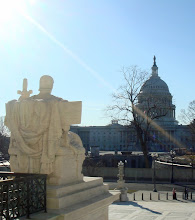Day 6: Political Interest
Athenian general and statesman Pericles observed, “Just because you do not take an interest in politics does not mean politics will not take an interest in you.” Perhaps this observation informed Plato’s warning, “One of the penalties for refusing to participate in politics is that you end up being governed by your inferiors.”
Until the 1960s, according to a 2017 article in “neaToday,” a publication of the National Education Association – hardly a conservative or even non-partisan organization, “Only 25 percent of U.S. students reach the ‘proficient’ standard on the NAEP Civics Assessment.” A factor contributing to this existentially concerning statistic is the fact that education in civics and government have been reduced over the years from typically three courses to one, and the didactic learning in this one course is not reinforced through any sort of practical application.
Kind reader, I described this as an existential concern. It seems crystal clear that a lack of understanding of our republic’s founding principles is the challenge of singular import for our nation’s future.
Published in 1835, “Democracy in America” recounts Alexis de Tocqueville’s travels through and observations of the United States and the character of the American people. He wrote, “You cannot doubt that in the United States the instruction of the people serves powerfully to maintain the democratic republic. It will be so, I think, everywhere that the instruction that enlightens the mind is not separated from the education that regulates mores.”
He recognized that to sustain the republic, all citizens needed to be informed about the social contract and the use of government to execute that contract. Without that knowledge, the people tacitly renounce their claim, in part and perhaps in whole, to individual liberty. Through such renouncement, they give themselves over to rule by their inferiors – people dedicated not to the preservation of their fellow citizens’ liberty but to their own grasp for power.
President Harry S. Truman famously quipped, “The ‘C’ students run the world.” Think of the people running for office – at any level. Would you entrust any one of them with the running of your life, the management of your affairs, or caring for your family? Are they equipped or do they have the vested interest to do these things better than you? If you’re anything like me, your answer is a resounding “no.” Yet one week hence, we will cast our votes for such ‘C’ students.
The reclamation of liberty lost will take a long, long time. It will not be accomplished on the third of November. We can, however, take the first step down that path. We must take an interest in politics. We must understand the civics that enable our social contract. It has been my hope that our weekly and now daily discussions would serve to advance that understanding and hope.
As I mentioned at the outset, my goal has not been to tell you what to think or for whom to cast your vote. Rather, I hoped to encourage critical thought on critical issues. Admittedly, my political preferences have surely come through. Notwithstanding that tipping of my hand, I hope you’ve been able to examine your positions and to be reassured of your beliefs and positions or to be moved to a new view of our republic.
We have but a week to go. I hope you’ll continue to explore with me the issues at stake in the upcoming election.

No comments:
Post a Comment